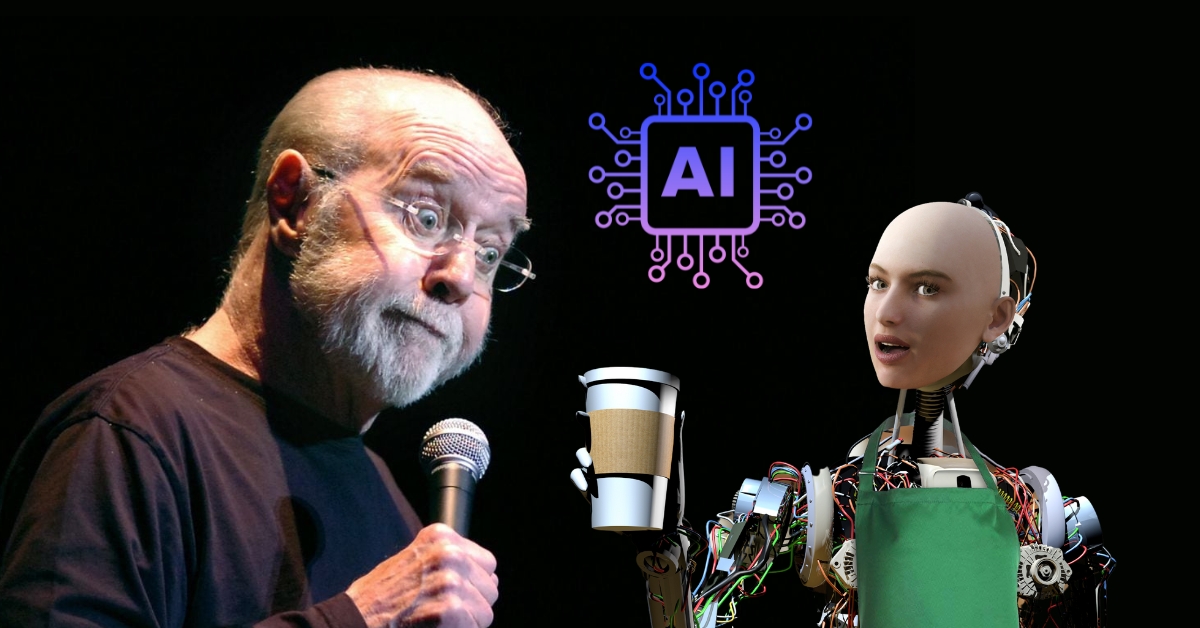
In the ever-evolving landscape of technology, one of the most intriguing intersections is the convergence of artificial intelligence (AI) and humor. George Carlin, a legendary stand-up comedian known for his sharp wit and social commentary, left an indelible mark on the comedy world.
This article explores how machines interpret humor and the unique perspective Carlin’s comedy provides on this evolving relationship.
I. The Essence of George Carlin’s Comedy
George Carlin, a counterculture icon and observational humorist, mastered the art of shedding light on societal absurdities. His stand-up routines were rich with critical observations about human behavior, language, and the paradoxes of modern life. Carlin’s humor was not just about making people laugh; it was a form of social commentary that challenged conventional norms and prompted introspection.
A. Carlin’s Language Play
One of Carlin’s trademarks was his linguistic prowess. He skillfully played with words, exposing the inconsistencies and contradictions embedded in everyday language. From dissecting euphemisms to questioning the use of specific terms, Carlin’s linguistic deconstruction invited audiences to challenge their preconceptions and see the world from a different perspective.
Read More: Twitter Video Download Made Easy: The Complete Guide
B. Social Critique Through Comedy
Beyond linguistic acrobatics, Carlin’s comedy was a powerful tool for social critique. He fearlessly tackled taboo subjects, pushing the boundaries of acceptable discourse. From politics to religion and everything in between, Carlin’s satire highlighted the hypocrisy and absurdities that often go unnoticed in daily life.
II. Artificial Intelligence and Humor
As AI technologies advance, researchers and engineers explore the possibility of infusing machines with a sense of humor. Understanding and generating humor is an intricate task for AI, involving the comprehension of language nuances, cultural references, and the ability to recognize incongruities. Here, we delve into the challenges and progress made in the field of AI and humor.
A. The Complexity of Humor
Humor is a complex cognitive phenomenon deeply rooted in human experience. It involves surprise, incongruity, and an understanding of social context. Teaching machines to grasp the subtleties of humor requires overcoming challenges in natural language processing, cultural awareness, and the ability to discern context-dependent meanings.
B. AI and Linguistic Challenges
Language is a fundamental aspect of humor, and for AI, understanding the intricacies of language is a monumental task. Ambiguities, double entendres, and cultural references can pose significant challenges for machines attempting to interpret and generate jokes. Researchers are developing algorithms that aim to capture the nuances of language to enhance AI’s ability to comprehend and produce humor.
Read More : Elon Musk’s Unlikely Venture: A Deep Dive into His Acquisition of Xvideos
C. Cultural Context and Diversity
Cultural nuances and societal context deeply influence humor. What may be humorous in one culture might not translate well to another. AI systems must navigate the vast landscape of cultural diversity to avoid inadvertently causing offense or misunderstanding jokes. Ensuring cultural sensitivity is crucial to developing AI capable of engaging in humor across diverse audiences.
III. AI and George Carlin: Bridging the Gap
Exploring the intersection of AI and George Carlin’s comedy unveils both the potential and limitations of machines in replicating human wit and satire. Carlin’s unique brand of humor offers insights into the challenges faced by AI and provides a lens through which we can analyze the current state of artificial comedic intelligence.
A. Linguistic Analysis Inspired by Carlin
Carlin’s linguistic acumen can serve as a valuable reference for AI researchers seeking to enhance language understanding in machines. His ability to dissect and manipulate language challenges AI developers to create algorithms beyond mere comprehension and engage in the nuanced playfulness inherent in Carlin’s comedic style.
B. Social Commentary in AI
Carlin’s legacy as a social critic prompts reflection on the role of AI in addressing societal issues through humor. Can machines effectively critique and satirize human behavior, institutions, and ideologies without perpetuating biases? Examining Carlin’s approach provides a framework for evaluating the ethical considerations of AI-generated content with a critical eye.
IV. The Ethical Dimensions of AI Comedy
Ethical considerations emerge as AI systems become more proficient in generating humorous content. The potential for bias, misinformation, and the unintended reinforcement of harmful stereotypes raises essential questions about the responsible development and deployment of AI-driven comedy.
A. Addressing Bias in AI
AI models, trained on vast datasets reflecting human behavior, may inadvertently perpetuate biases in the data. Ensuring that AI-generated humor remains inclusive and avoids reinforcing stereotypes requires ongoing efforts to identify and mitigate bias in training data and algorithms.
B. The Role of AI in Shaping Public Opinion
Comedic content has the power to influence public opinion and perceptions. As AI systems are integrated into various media platforms, there is a need to establish guidelines and ethical frameworks to govern the creation and dissemination of AI-generated humor. Carlin’s legacy reminds us to approach our responsibility keenly and be aware of its impact on societal discourse.
V. Future Horizons: AI, Comedy, and Beyond
The evolving relationship between AI and comedy opens up new possibilities and challenges for the future. Examining the trajectory of AI in the realm of humor, inspired by the insights of George Carlin, offers a glimpse into the potential landscapes of entertainment, creativity, and social commentary.
A. AI as a Collaborative Comedian
The prospect of AI collaborating with human comedians raises intriguing possibilities. Can machines complement human creativity, offering unique perspectives and enhancing comedic performances? The synergy between AI and human creativity may redefine the boundaries of humor and pave the way for innovative comedic expressions.
B. Redefining Creativity and Expression
AI’s role in comedy extends beyond generating jokes; it challenges our understanding of creativity and expression. Carlin’s ability to provoke thought through humor is a benchmark for AI systems striving to contribute meaningfully to artistic and intellectual discourse. The convergence of AI and creativity prompts us to reconsider the nature of human ingenuity and the evolving landscape of entertainment.
Conclusion
In the vast realm where AI and George Carlin’s comedy intersect, we find a tapestry of linguistic brilliance, social critique, and the ongoing pursuit of humor in the digital age. Carlin’s legacy challenges AI developers to reach new heights in understanding language, culture, and societal dynamics.
As we navigate the ethical dimensions of AI-driven comedy, we must remain vigilant in ensuring that these technological advancements contribute positively to our collective understanding and appreciation of humor, much like the legendary George Carlin did in his time.
The future promises a fascinating journey where AI and comedy coalesce, shaping the landscape of entertainment and cultural expression for generations to come.







